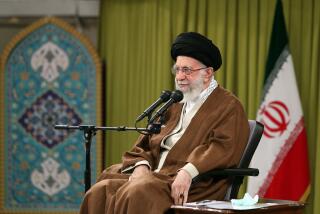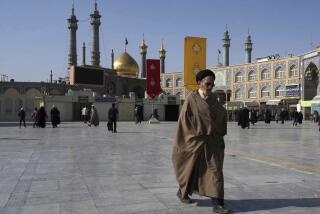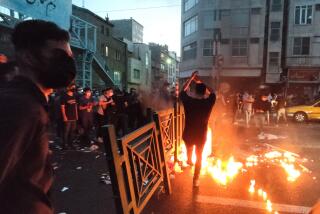Despite Pact, Iranian Clerics Still Say Rushdie Must Die
- Share via
TEHRAN — Four days after Iran promised Britain that it would not carry out a death edict against writer Salman Rushdie, conservatives inside the country lashed out at the deal, insisting Monday that the author of “The Satanic Verses” still must die for blasphemy.
Several senior clerics and newspapers took up the issue, demanding that the government clear up ambiguities around the accord and hinting that no government is entitled to turn its back on a solemn religious duty laid down by the Islamic Republic’s late founder, Ayatollah Ruhollah Khomeini.
The backlash was not surprising, one Western diplomatic source here said. The real question is whether the moderate government of President Mohammad Khatami will stick by the commitments it made, or whether in coming days it will start to backslide under domestic political pressure.
So far, Iran’s hard-line supreme leader, Ayatollah Ali Khamenei, has not joined in the criticism, suggesting that he accepts the understanding hammered out between Iran and Britain. The deal opened the way for the countries to announce resumption of diplomatic ties at the level of ambassador.
On Thursday, Iran essentially reiterated, but more loudly and emphatically than before, positions that it already had taken:
First, that the late Khomeini’s 1989 edict, or fatwa, stands, because only he could have revoked it.
However, Iran’s government does not intend to act upon the edict, nor will it assist or encourage anyone to kill Rushdie or others associated with “The Satanic Verses.”
Finally, the government “disassociates” itself from a $2.5-million bounty on Rushdie’s life offered by the 15 Khordad Foundation, a private fund set up after the revolution with confiscated wealth of the late Shah Mohammed Reza Pahlavi and his family.
The most serious criticism of the government’s accord came from Grand Ayatollah Mohammed Fazel Lankarani, one of Iran’s highest-ranking Shiite clerics. He issued a statement from Qom saying that Britain should not consider Khomeini’s edict finished.
“The fatwa is neither revocable nor alterable, and now its implementation is obligatory on all Muslims throughout the world,” Lankarani said. “If the government of the Islamic Republic of Iran does not intend to assist the implementation of this fatwa, it must be among its prime supporters.”
Two other clerics, Grand Ayatollah Hossein Nouri Hamedani and Ayatollah Hossein Mazaheri, also stated that the edict must still be carried out, local media reported.
Meanwhile, a newspaper close to conservative mullahs, Jomhori Islami, chided the government for drawing a distinction between the state and religion.
“How is it conceivable that . . . Islamic governments simply step aside and witness insults against Islamic sanctities?” it asked. “Is the promotion of ties with a second-rate country worth taking such a position?”
“The execution of that despised apostate [is] our duty and a must,” declared the rightist daily Kayhan.
More to Read
Sign up for Essential California
The most important California stories and recommendations in your inbox every morning.
You may occasionally receive promotional content from the Los Angeles Times.













